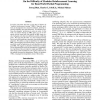Free Online Productivity Tools
i2Speak
i2Symbol
i2OCR
iTex2Img
iWeb2Print
iWeb2Shot
i2Type
iPdf2Split
iPdf2Merge
i2Bopomofo
i2Arabic
i2Style
i2Image
i2PDF
iLatex2Rtf
Sci2ools
116
click to vote
AAAI
2006
2006
On the Difficulty of Modular Reinforcement Learning for Real-World Partial Programming
In recent years there has been a great deal of interest in "modular reinforcement learning" (MRL). Typically, problems are decomposed into concurrent subgoals, allowing increased scalability and state abstraction. An arbitrator combines the subagents' preferences to select an action. In this work, we contrast treating an MRL agent as a set of subagents with the same goal with treating an MRL agent as a set of subagents who may have different, possibly conflicting goals. We argue that the latter is a more realistic description of real-world problems, especially when building partial programs. We address a range of algorithms for single-goal MRL, and leveraging social choice theory, we present an impossibility result for applications of such algorithms to multigoal MRL. We suggest an alternative formulation of arbitration as scheduling that avoids the assumptions of comparability of preference that are implicit in single-goal MRL. A notable feature of this formulation is ...
| Added | 30 Oct 2010 |
| Updated | 30 Oct 2010 |
| Type | Conference |
| Year | 2006 |
| Where | AAAI |
| Authors | Sooraj Bhat, Charles Lee Isbell Jr., Michael Mateas |
Comments (0)

